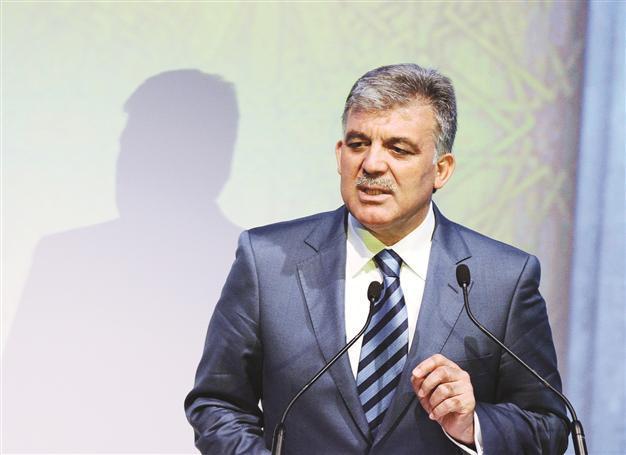Gül tones down Turkey’s Egypt stance

President Gül’s message to Egypt’s Mansour was sent as a requirement of minimum courtesy between the two states, the presidency spokesman says.
Turkish President Abdullah Gül’s letter to Egypt’s Interim President Adly Mansour on July 24, congratulating the country’s national day was a result of the Turkish government’s move to “tone down” its strong stance against the new administration in Cairo brought to power by military who toppled the elected President Mohamad Morsi on July 3, a high-ranking Turkish official told the Hürriyet Daily News.The source, who asked not to be named, said that the decision was taken in an emergency meeting chaired by Prime Minister Tayyip Erdoğan on July 24, mainly on Syria, but during which developments in Egypt and the Middle East were discussed in detail.
Erdoğan had called that meeting mainly regarding the high tension along the Turkish-Syrian border following the fierce fight between the radical Islamist Al Nusra and the Kurdish autonomist Democratic Union Party (PYD) militants, causing Turkish worries regarding the civil war in Syria and the Turkish government’s own initiative to pursue peace with the outlawed Kurdistan Workers’ Party (PKK) for a political settlement to the Kurdish problem; having obvious links with Iraq and Iran where Kurds live as well. A number of ministers including Foreign, Defense, Justice and Interior ministers and ranking officials including the Chief of General Staff and head of National Intelligence Organization (MİT) had attended the meeting. In the evening hours, Gül’s press advisor Ahmet Sever spoke to Anadolu Agency, revealing that Gül has sent a message to Mansour congratulating him because on the national day.
It should be noted that Gül’s has been the first message from Turkey to the interim administration in Egypt; there were no messages for Mansour before because of him assuming power, since PM Erdoğan and Foreign Minister Ahmet Davutoğlu had underlined a number of times before that Ankara would not acknowledge the interim government after the coup against Morsi as a legitimate one. Perhaps that is the reason why Sever had to add another sentence to his statement to Agency that Gül’s message had been “written and sent in consultation with related bodies of the government,” seemingly as a pre-emptive measure against possible speculations.
Before the July 24 meeting, there had been a number of developments which caused Ankara to fine tune its Egypt policy. Egypt’s Ambassador to Ankara, Abderahman Salaheldin, had declined to attend the fast-breaking dinner invitation on July 18 by Prime Minister Erdoğan, who delivered another bitter speech against the coup in Egypt and criticized the Western and Arab reluctance to condemn it. On July 19, Selahaddin had paid a visit to Foreign Minister Davutoğlu to talk about the situation in Cairo. On July 22, HDN published an interview with Selahaddin, who said that he believed that the problems of the day were not so important and the Turkish-Egyptian ties would be back on track soon. The same day there was a telephone conversation between Davutoğlu and the U.S. Secretary of State John Kerry, during which the Middle East, Syria and Egypt issues were reportedly discussed.
On the same day, July 24, almost the same time as the meeting in Ankara finished, the Pentagon had announced that the delivery of four F-16 fighter jets to the interim government was suspended by President Barack Obama. Turkish sources told HDN that the position of the Turkish government might have been a factor in the U.S. decision to suspend the military delivery to Egypt, which had been seen as an approval of the coup in Egypt when it was first announced, but that decision and the phone conversation between Kerry and Davutoğlu did not have any effect on Ankara’s decision to tone down.
According to the HDN source, there were a few reasons behind his toning down. At first, Ankara understood that the political settlement in Egypt is likely to take some more time, since the people of Egypt are divided between pro and anti Morsi lines. Secondly, it would be much more difficult to try to support the return to democracy in Egypt as soon as possible without working political channels between Ankara and Cairo. Thirdly, Turkey had always worked in a complimentary role in Egypt’s efforts in the Middle East peace process, the Israeli-Palestinian conflict. And fourthly, the toppling of the Muslim Brotherhood power in Egypt would affect the situation in Palestine (because of Brothehood-linked Hamas in Gaza) and the Brotherhood-motivated armed opposition in Syria. The assessments within the Foreign Ministry and the Intelligence based upon the political balances in the region seemingly played an important role in Erdoğan’s toning down his strong stance to undo the coup and bring Morsi back to power immediately.
The Turkish government’s toning down on Egypt policy might have reflections on its Palestinian-Israeli and Syrian policies as well.











